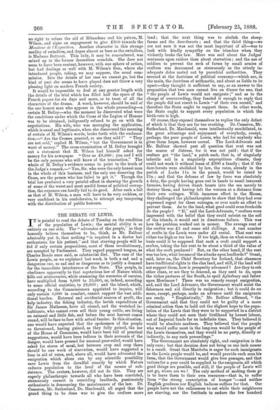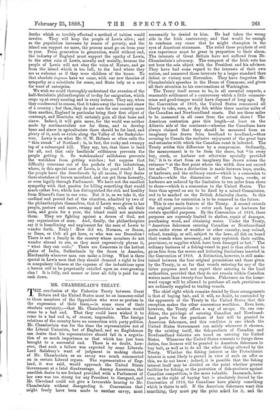THE DEBATE ON LEWIS.
IT is painful to read the debate of Tuesday on the condition of the population of Lewis ; the mental ability is so entirely on one side. The "advocates of the people," as they honestly believe themselves to be, think, as Mr. Balfour admirably put it, that nothing "is required in a doctor but enthusiasm for his patient," and that starving people will be fed if only certain propositions, most of them revolutionary, are accepted by Parliament. They regard peppered tongue, as Charles Heade once said, as substantial diet. The case of the Lewis people, as we explained last week, is both a sad and a dangerous one, so sad and so dangerous as to justify a demand for the immediate interference of the State. The people, in obedience apparently to that mysterious law of Nature which kills out aristocracies, while cramming the nurseries of curates, have multiplied from 8,000 to 25,000, or, indeed, according to some official statistics, to 28,000; and the island, which, according to the Commissioners appointed to inquire, will only sustain 6,000 in comfort, cannot support the vast addi- tional burden. External and accidental sources of profit, the kelp industry, the fishing industry, the lavish expenditure of Sir James Matheson, have all ceased, and the wretched in- habitants, who cannot even sell their young cattle, are living on oatmeal and little fish, and before the next harvest comes round, will be face to face with actual famine. In this situation, one would have expected that the spokesmen of the people so threatened, having gained, as they fully gained, the ear of the House of Commons, would have been full of practical suggestions, would have been tedious in their accounts of the danger, would have pressed for unusual poor-relief, would have asked for stores of meal, lest between crop and crop there should be one week of starvation, would have suggested a loan in aid of rates, and, above all, would have advocated the emigration which alone can by any scientific possibility save Lewis from the dreadful remedy by which Nature reduces population to the level of the means of sub- sistence. The orators, however, did not do this. They are eagerly philanthropic towards all who have been convicted, strenuously earnest in overriding landlords, passionately enthusiastic in denouncing the maintenance of the law. Dr. Cameron, Mr. Sutherland, Dr. Macdonald, all urged that the grand thing to be done was to give the crofters more
land ; that the next thing was to abolish the sheep- farms and the deer-forests ; and that the third thing—we are not sure it was not the most important of all—was to look with kindly sympathy on the islanders when they violently broke the law. More was said about the Judges' sentences upon raiders than about starvation ; and the use of soldiers to prevent the sack of farms by small armies of crofters was denounced as strenuously as the utterly in- adequate doles meted out by parochial authorities. They sneered at the doctrines of political economy—which are, in the main, the doctrines of arithmetic, and about as liable to be upset—they thought it sufficient to say, as an answer to the proposition that two men cannot live on dinner for one, that "the people of Lewis would not emigrate ;" and as to the charge of overcrowding, they fancied it enough to reply that the people did not resort to Lewis "of their own accord," and therefore the State ought to support them. In other words, the State ought to support every population in which the birth-rate is high.
Of course, they exposed themselves to replies the only defect of which is that they are far too crushing. Dr. Cameron, Mr. Sutherland, Dr. Macdonald, were intellectually annihilated, to the great advantage and enjoyment of everybody, except, perhaps, the poor people of Lewis, who feel for anybody who gives them hopes, however unreal. The Lord-Advocate and Mr. Balfour showed past all question that rent was not the source of distress, for it was not paid ; that if the crofters got "the land," a patch each, that is, of singulArly infertile soil in a singularly unpropitious climate, they could not work it without loans of £300 a family ; that if the deer-forests were abolished by law, the rates, already in the parish of Lochs us, in the pound, would be raised to 21s. ; and that the defence of law by force was absolutely a duty, the people having gone out in bands to assail innocent farmers, having driven dumb beasts into the sea merely to destroy them, and having left the venison at a distance from their own cottages. With immense effect in the House, they challenged the philanthropists to show that they had ever expressed regret for these outrages, or ever made an effort to prevent them. As to the land, what good could even freeholds do the people ? "If," said the Lord-Advocate, "crofters were impressed with the belief that they could subsist on the soil of the islands, it would end in disastrous failure. This was how the problem worked out in money. The average rent of the crofter was £3 and some odd shillings. A vast number of crofts in the Lewis were under .22 rental. That rent was either too high or too low. If too high, then on what economic basis could it be supposed that such a croft could support a crofter, taking the fair rent to be about a third of the value of what the croft produced? But, on the other hand, if the rent was too low, what becameof the attacks upon landlords ?" Grant, said, later on, the Chief Secretary for Ireland, that clansmen have traditional rights in the clan land, and still, if the land will not support them, how is prosperity advanced? Are they to rob other clans, or are they to descend, as they used to do, upon the richer pastures of the South, to spoil Aylesbury and fatten upon Mentmore There was no remedy except emigration, and, said the Lord Advocate, the Government would assist the fishermen and aid directly in emigration ; but it could do no more, except, perhaps, make an advance until the emigrants are ready. " Emphatically," Mr. Balfour affirmed, "the Government said that they could not be guilty of a more criminal action than to hold out the slighest hope to the popu- lation of the Lewis that they were to be supported in a district where they could not earn their livelihood by honest labour, out of Imperial funds for an indefinite time. They believed it would be absolute madness. They believed that the people who would suffer most in the long-run would be the people of the Lewis themselves, and they would be no party, directly or indirectly, to any such proceedings."
The Government are absolutely right, and emigration is the only cure ; but that decision does not bring us one inch nearer to a result. Grant that Manitoba is eager for such immigrants as the Lewis people would be, and would provide each man his farm, that the Government would give free passages, and that rations for a year could be supplied to the emigrants, all which good things are possible, and still, if the people of Lewis will not go, where are we ? The only method of making them go is to leave them to their own resources—that is, to suffer from "the strong conscription of hunger "—and neither English goodness nor English badness suffices for that. Our people have not the callousness to eat while their neighbours are starving, nor the fortitude to endure the few hundred deaths which so terribly effectual a method of tuition would involve. They will keep the people of Lewis alive ; and as the population increases by reason of poverty, and the island can support no more, the process must go on from year to year. From generation to generation, world without end, the industry of England must support the apathy of Lewis, to the utter ruin of Lewis, morally and socially, because the people of Lewis will not obey the voice of Nature, and go from the island which is too full, to the land where they are as welcome as if they were children of the house. To that absolute impasse have we come, with our new theories of sympathy as a substitute for sense, and State help as a cure for want of enterprise.
We wish we could thoroughly understand the aversion of the half-Socialistic philanthropists of to-day for emigration, which crops up at every meeting and in every lecture. They say, when they condescend to reason, that it takes away the bone and sinew of a country ; but then, they do not care for one country more than another, England in particular being their first object of contempt, and Manitoba will certainly gain all that bone and sinew. Indeed, it will gain more, for the world was neither made by sentimentalists nor for them, and to develop bone and sinew in agriculturists there should be fat land, and plenty of it, such as exists along the Valley of the Saskatche- wan. Lewis is on what Mr. 0. W. Holmes so often calls the "thin streaky' of Scotland ; is, in fact, the rocky and swampy top of a submerged hill. They say, too, that there is land for all, and that only landlords' selfishness prevents the people getting it. So watchmakers' selfishness prevents the watchless from getting watches ; but suppose that difficulty overcome out of the pockets of the industrious, where, in this special case of Lewis, is the good result ? Let the people have the deer-forests by all means, if they desire those stretches of barren moorland, and can get them honestly, or even legally through Parliament. We have not the smallest sympathy with that passion for killing something that would much rather live, which has distinguished the rich and healthy from Nimrod's time to our own. But it is, as we take it, the cardinal and proved fact of the situation, admitted by two of the philanthropists themselves, that if Lewis were given to her people, pasture and moor, swamp and valley, with all their huts, and grain for a year, the island could not maintain them. They are fighting against a decree of God, not any organisation of man. And, finally, the philanthropists say it is humiliating and unpleasant for the men of Lewis to wander forth. Truly ! How did we, Norman, or Saxon, or Dane, or Celt all get here, or who was our Deucalion ? There is not a family in the country whose members do not wander abroad to see, as they most expressively phrase it, "what they can make." There are Camerons in the hottest plains of India, Sutherlands by the dozen in America, Macdonalds wherever man can make a living. What is there special in Lewis men that they should demand a right to live in compulsory idleness at the expense of the industrious upon a barren soil to be perpetually entailed upon an ever-growing clan ? It is folly, and sooner or later all folly is paid for in cash down.







































 Previous page
Previous page